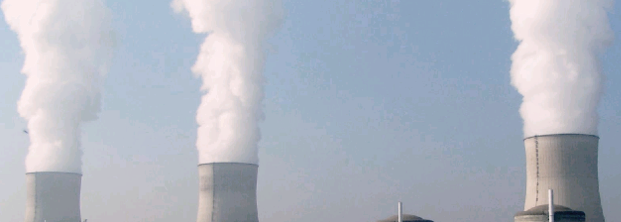And no, this is not any attempt on my part to start bashing Obama after exposing my earlier positive thoughts about Hillary. I'm not convinced either of them will stand up to corporate interests. It's more of an addendum to my anxieties about expanding nuclear power.
When residents in Illinois voiced outrage two years ago upon learning that the Exelon Corporation had not disclosed radioactive leaks at one of its nuclear plants, the state’s freshman senator, Barack Obama, took up their cause.
Mr. Obama scolded Exelon and federal regulators for inaction and introduced a bill to require all plant owners to notify state and local authorities immediately of even small leaks. He has boasted of it on the campaign trail, telling a crowd in Iowa in December that it was “the only nuclear legislation that I’ve passed.”
“I just did that last year,” he said, to murmurs of approval.
Um, not so fast, you clever liberal agent of progressive change.
While he initially fought to advance his bill, even holding up a presidential nomination to try to force a hearing on it, Mr. Obama eventually rewrote it to reflect changes sought by Senate Republicans, Exelon and nuclear regulators. The new bill removed language mandating prompt reporting and simply offered guidance to regulators, whom it charged with addressing the issue of unreported leaks.
Those revisions propelled the bill through a crucial committee. But, contrary to Mr. Obama’s comments in Iowa, it ultimately died amid parliamentary wrangling in the full Senate.
In other words, he caved in, succumbing to the desires of the largest nuclear plant operator in the United States. And I'm certain this next bit is purely coincidental.
Since 2003, executives and employees of Exelon, which is based in Illinois, have contributed at least $227,000 to Mr. Obama’s campaigns for the United States Senate and for president. Two top Exelon officials, Frank M. Clark, executive vice president, and John W. Rogers Jr., a director, are among his largest fund-raisers.
Another Obama donor, John W. Rowe, chairman of Exelon, is also chairman of the Nuclear Energy Institute, the nuclear power industry’s lobbying group, based in Washington. Exelon’s support for Mr. Obama far exceeds its support for any other presidential candidate.
In addition, Mr. Obama’s chief political strategist, David Axelrod, has worked as a consultant to Exelon. A spokeswoman for Exelon said Mr. Axelrod’s company had helped an Exelon subsidiary, Commonwealth Edison, with communications strategy periodically since 2002, but had no involvement in the leak controversy or other nuclear issues.
My God, we're talking about a situation in which millions of gallons of contaminated water leaked out, and the nuclear industry is given the upper hand in how to control and/or spin the situation. The levels of tritium in the leaked water, a radioactive byproduct of nuclear power, reportedly did not exceed federal safety standards. Nevertheless, I, for one, don't believe it's too much to ask that any and all leaks be reported.
The rewritten bill also contained the new wording sought by Exelon making it clear that state and local authorities would have no regulatory oversight of nuclear power plants.
[...]
The revised bill was never taken up in the full Senate, where partisan parliamentary maneuvering resulted in a number of bills being shelved before the 2006 session ended.
Still, the legislation has come in handy on the campaign trail. Last May, in response to questions about his ties to Exelon, Mr. Obama wrote a letter to a Nevada newspaper citing the bill as evidence that he stands up to powerful interests.

I'm getting that queasy feeling again -- the same feeling I get during every election cycle when it becomes clear to me just how much change I can expect from a new administration.
Power to the people!
Crossposted at Big Brass Blog

No comments:
Post a Comment